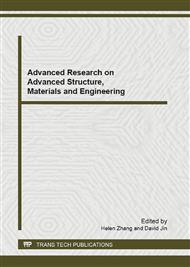p.88
p.92
p.96
p.100
p.106
p.110
p.114
p.119
p.123
Supply Chain Scheduling with Transportation Cost on a Single Machine
Abstract:
Supply chain scheduling problem is raised from modern manufacturing system integration, in which manufacturers not only process orders but also transport products to customer’s location. Therefore, the system ought to consider how to appropriately send finished jobs in batches to reduce transportation costs while considering the processing sequence of jobs to reduce production cost. This paper studies such a supply chain scheduling problem that one manufacturer produces with a single machine and deliveries jobs within limited transportation times to one customer. The objective function is to minimize the total sum of production cost and transportation cost. The NP hard property of the problem is proved in the simpler way, and the pseudo-dynamic programming algorithm in the literature is modified as the MDP algorithm to get the optimal solution which is associated with the total processing times of jobs.
Info:
Periodical:
Pages:
106-109
DOI:
Citation:
Online since:
November 2011
Authors:
Price:
Сopyright:
© 2012 Trans Tech Publications Ltd. All Rights Reserved
Share:
Citation:


